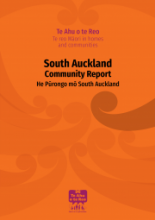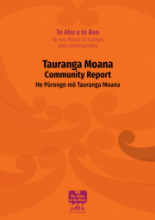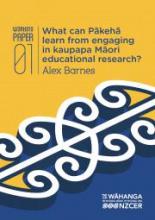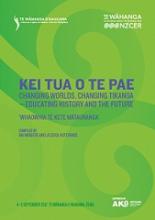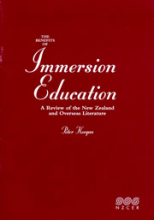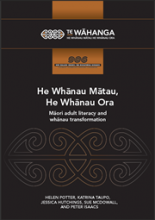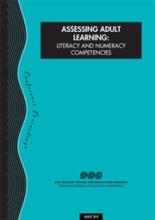NZCER's Māori and education work
You are here
Māori and education
Recent Māori and education research publications
The COMPASS project is part of NZCER’s Te Pae Tawhiti Government Grant programme of research. It is also aligned to the broad goals and aspirations of NZCER, in that its overarching purpose is to give effect to Te Tiriti o Waitangi and the notion of Whakatere Tōmua—Wayfinding. The COMPASS project has examined the ways kaiako, ākonga, and whānau navigate educational experiences and contexts.
The COMPASS project is part of NZCER’s Te Pae Tawhiti Government Grant programme of research. It is also aligned to the broad goals and aspirations of NZCER, in that its overarching purpose is to give effect to Te Tiriti o Waitangi and the notion of Whakatere Tōmua—Wayfinding. The COMPASS project has examined the ways kaiako, ākonga, and whānau navigate educational experiences and contexts.
The Manaakitia ngā tamariki kia ora ai | Supporting children’s wellbeing publication shares themes and narratives from six good-practice primary and intermediate schools that are designing and using approaches to enhance the wellbeing of tamariki. The schools were invited to be part of this study as their Wellbeing@School data showed tamariki Māori, and other learners, all had high wellbeing. These six schools had positive trends over time or high values in three indicators (wellbeing, equitable relationships, and aggressive behaviour) which suggested they were engaged in an active change journey.
He rangahau i whakaritea mā Te Mātāwai, e Te Wāhanga - Te Rangahau Mātauranga o Aotearoa, i te tau 2019.
A report prepared for Te Mātāwai by Te Wāhanga–New Zealand Council for Educational Research l NZCER, 2019.
He pūrongo i whakaritea mā Te Mātāwai, e Te Wāhanga - Te Rangahau Mātauranga o Aotearoa, i te tau 2018.
A report prepared for Te Mātāwai by Te Wāhanga–New Zealand Council for Educational Research l NZCER, 2018.
Te reo Māori and school provisions for ākonga Māori - findings from the NZCER 2019 National survey of English-medium primary schools
Te Wāhanga, on behalf of Oranga Tamariki, produced this report on the benefits of Social Workers in Schools (SWiS) in kura kaupapa Māori and kura ā-iwi (kura), using a kaupapa Māori approach.
He rangahau i whakaritea mā Te Mātāwai, e Te Wāhanga - Te Rangahau Mātauranga o Aotearoa, i te tau 2020.
A report prepared for Te Mātāwai by Te Wāhanga–New Zealand Council for Educational Research l NZCER, 2020.
He mea tuhi nā Jessica Hutchings, Rawinia Higgins, Nicola Bright, Basil Keane, Vini Olsen-Reeder, Maraea Hunia, me Jenny Lee-Morgan rāua ko Eruera Morgan, Jen Martin rāua ko Stephanie Fong, Waitiahoaho Emery, Titoki Black, Hinerangi Edwards rāua ko Kiwa Hammond, Lynne Harata Te Aika, me Cathy Wylie, Rachel Felgate, Rachael Kearns.
This report from the Ka Whānau Mai Te Reo project puts the spotlight on te reo Māori at times of transition. It looks at the pathways available to whānau to support their reo aspirations at three key points: starting school, moving from primary to secondary school, and moving beyond secondary school.
This recent working paper focuses on how Pākehā have become involved in Māori-determined and controlled educational research, and what issues inhibit and facilitate their work. You can find out more by watching the video clip, in which researcher Alex Hotere-Barnes talks to Sarah Boyd about the project.
This is the first report from a 3-year (2012–2015) kaupapa Māori research project that investigates how best to support the continuity of reo Māori development of whānau as they transition between kōhanga reo, kura kaupapa primary, wharekura, secondary and beyond. It aims to provide useful information about the reo Māori education options that are most likely to help whānau achieve their reo Māori aspirations. The full report: Ka whānau mai te reo.
The proceedings are now available from the second Kei Tua o Te Pae hui, Changing Worlds, Changing Tikanga—Educating History and the Future, held at Te Wānanga o Raukawa in Ōtaki in conjunction with NZCER in September last year. The proceedings include presentations and a series of reflections from participants. They were launched at the He Manawa Whenua Indigenous Research conference.
Te Wāhanga has been working with the Institute of Environmental Science and Research Ltd (ESR) on a project about future food technologies and Māori well-being. It explored the question of how can dialogue with diverse Māori communities suport sustainable decision-making on future food technologies such as biotechnology, nanotechnology, sustainable agriculture and functional foods. Working with kaupapa Māori principles, we interviewed Māori scientists, government workers and whānau.
We produced a four page brochure on the findings from the project (which can be downloaded below). This research is part of a wider project called Coming to the table, Sustainable decision-making for future food technologies.
This report presents the findings of a research project conducted by NZCER in collaboration with Literacy Aotearoa. The research asked the question: “What are the impacts on whanau when parents/caregivers undertake programmes to develop their literacy and numeracy in English.”







